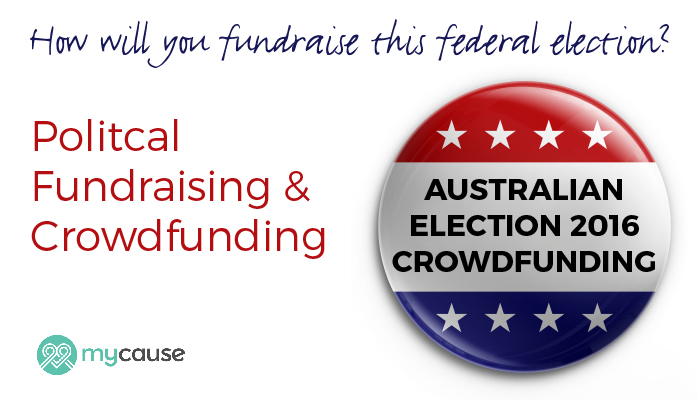How to Raise Money for a Political Campaign in Australia

Charitable fundraising is notoriously difficult - raising money for a political campaign no less so. A vision of political staffers sitting at tables around the country tearing their hair out over campaign-financing strategies comes to mind. But what if it needn’t be so difficult? Crowdfunding has revolutionised political fundraising in the USA and Europe, in big and small countries alike. But it’s yet to take off in Australia and with a federal election looming there’s never been a better moment.
It’s an exciting time in Australian Federal politics. In September Malcolm Turnbull challenged and defeated Tony Abbott in a dramatic leadership ballot in Canberra to become Australia's 29th prime minister. A cabinet reshuffle quickly followed which, notably, saw the appointment of Marise Payne, the nation's first female defence minister and Ken Wyatt, Australia's first Indigenous Government frontbencher, who took up the role of assistant health minister.
As Abbot was already part way through his term when he was ousted, Turnbull will have little time to engender trust with the nation’s voters before the next federal election, which must be held on or before 14 January 2017. In July (before the leadership spill) the ACTU speculated the coalition would call an early election, strategically, before the May budget. But in November, new Prime Minister Turnbull downplayed the prospect of an early federal election, saying it would likely be around September or October next year.
Irrespective of exactly when the election will be held, one thing is for certain, the battle for parliamentary seats will be as tough as ever. And, as always, candidates will need to ensure they have the financial means to deliver winning campaigns that secure the necessary number of votes to guarantee a place in Parliament. This is where crowdfunding comes in.
For those still new to this next level fundraising technique, crowdfunding is a way of funding a project or cause with small online pledges from a large pool of people. This is what Barack Obama did, on a grand scale, in 2008 when he won the US presidential election. 80% of the $639 million dollars Obama raised came from donations that were 20 dollars or less. His campaign ultimately demonstrated everyone could be an agent of change regardless of financial capability or background.
But more than that, Obama’s strong digital campaign also revealed how fundraising and marketing could be effectively integrated using the right vehicle (social media) and correct messaging (‘change we can believe in’). The invitation to donate to his campaign was skillfully delivered online to new, younger audiences and was framed as an opportunity to get involved and participate. Because most social media platforms make it easy for anyone to sign up, effectively anyone could participate in Obama’s campaign as it unfolded in real time.
While Obama’s campaign revolutionised campaigning in the US forever, marking a distinct change from old school methods to next generation web savvy, in Australia fundraising methods are still fairly predictable. The majority of political donations come in the form of donations from corporations. Donations and affiliation fees from trade unions also play a role, and to a lesser extent donations from individuals. Fundraising events and raffles all form part of the fundraising mix and have their place. But if political candidates want to gain an advantage on the hard fought election battlefield they will need to embrace more innovative techniques, like crowdfunding. And why not? As it’s a basic tenet of fundraising to diversify income streams to disperse risk, crowdfunding provides another stream by which to do this.
As demonstrated, crowdfunding is more than just a fundraising tool. It has the capacity to reach donors far and wide, gaining support and cut through. It’s also an invaluable acquisition tool, efficiently capturing critical, clean donor data to add to databases for future campaigning. Finally, unlike events or mail outs, crowdfunding campaigns don’t require any financial outlay. Instead platforms like mycause take a small commission from the total amount raised.
With the Australian federal election likely just around the corner it will be interesting to see if politicians try and model the success of their international counterparts. It would seem crazy not to.
Case studies on mycause:
Local Member for Manly (NSW) Councillor Candy Bingham fundraising in her community
State Member for Bright (SA) David Speirs MP fundraising in his community
Australia's largest crowdfunding campaign raising over $1million dollars on mycause
*Mycause is 100% compliant with the Commonwealth Electoral Act (1918) and can tailor campaigns to suit each state or territory.
references
http://www.nytimes.com/2008/12/05/us/politics/05donate.html?_r=0
http://www.theguardian.com/voluntary-sector-network/2012/apr/02/crowdfunding-quick-fix-fundraisers
http://www.dragonflyeffect.com/blog/dragonfly-in-action/case-studies/the-obama-campaign/
https://en.wikipedia.org/wiki/Barack_Obama_presidential_campaign,_2008